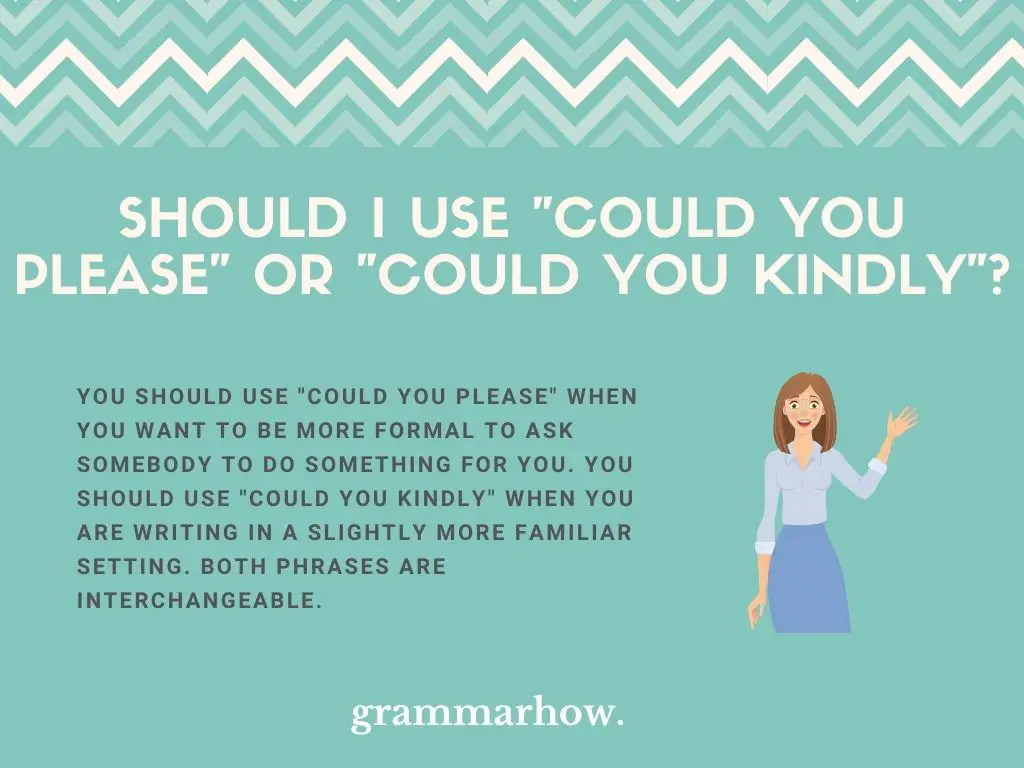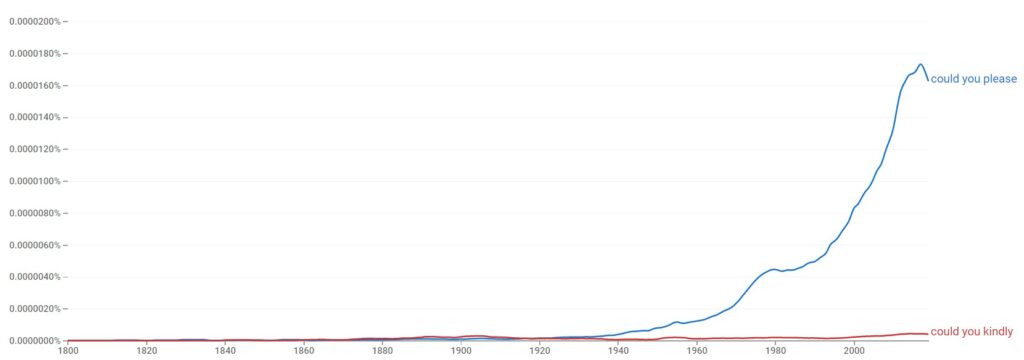We should always strive to be as polite as possible. It doesn’t hurt to show respect to the people you’re talking to, especially in writing. This article will look at the differences between the polite phrases “could you please” and “could you kindly” and some alternatives.
Should I Use “Could You Please” Or “Could You Kindly”?
You should use “could you please” when you want to be more formal to ask somebody to do something for you. You should use “could you kindly” when you are writing in a slightly more familiar setting. Both phrases are interchangeable.

When we encounter phrases like this, it’s great to learn about them and what they mean. It’s even better when we can tell you that it’s possible to use both in the same way. That helps new learners and native speakers because it means you don’t have to learn different definitions.
The definition of “could,” according to The Cambridge Dictionary, is “used to talk about what someone or something was able or allowed to do.” We use it to request somebody to do something for us.
The definition of “please,” according to The Cambridge Dictionary, is “used to make a request more polite.” Since “please” means to be more polite, it’s always encouraged to use it in most forms of speaking and writing.
Is “Could You Please” Or “Could You Kindly” Used The Most?
What about the popularity between the two phrases, then? Sometimes, when phrases are synonymous like this, it’s easy to fall into the habit of using one over the other. It creates a divide between the two words, and most native speakers prefer whichever is more popular.
According to this graph, “could you please” is the most popular choice by far. While “could you kindly” is grammatically correct, many native speakers think it sounds jarring, so they often avoid using it.

“Could you please” flows nicely, both in speech and in reading. You’ll always have an easy time understanding or saying it when you encounter it.
On the other side, “could you kindly” doesn’t flow quite as nicely. Some people believe the difference between “you” and “kindly” is too harsh. Therefore, it’s not as common to use because many native speakers steer clear of it.
Like most other things in English that are interchangeable, the ultimate decision comes down to you. If you genuinely prefer the sound of one over the other, you should use it.
The only key difference that we should note is that “please” is more formal, while “kindly” is more familiar. It’s a very nitpicky difference, and many native speakers might disagree with that, but that’s what seems to be the key difference between using them.
Can “Could You Please” And “Could You Kindly” Be Used Interchangeably?
We’ve already explained a lot about this, so we’ll keep it brief.
“Could you please” and “could you kindly” are interchangeable phrases. You can use both of them to request somebody to do something for you. Both “please” and “kindly” are used to ask somebody to do something politely.
We defined “please” earlier as meaning “to make a request more polite.” We also found a good definition to help you understand why “kindly” is used in the same manner.
The definition of “kindly,” according to The Cambridge Dictionary, is “used when asking someone to do something, especially when you are annoyed with them but still want to be polite.”
Both mention “polite” as an option in the definition. Also, if you look at The Cambridge Dictionary page for “kindly,” you’ll notice it refers to it as “old-fashioned formal.” This might be another reason why so many people use “please” instead of it.
Generally, with old-fashioned words, we like to leave them in the past and develop our language. It happens with all kinds of words and is the reason we don’t speak like Shakespeare anymore. “Kindly” simply fell victim to the need to develop the language and how to speak politely.
Is “Could You Please” Or “Could You Kindly” Most Polite?
Both phrases are polite; there’s no denying that. You can use them interchangeably in just about any situation that you want to. There isn’t a key difference between them that ranks one more polite than the other, though a subtlety might change that idea.
“Could you please” may be more polite than “could you kindly.” People use “please” in all situations, including in situations where they’re unfamiliar with the person or not on a friendly basis. “Kindly” is often reserved for more familiar people.
Again, this isn’t a definitive rule that comes up in English. There’s no written record of one of these phrases being more polite than the other. It’s mostly up to the individual to use them however they want.
Still, if we had to rank them in order of politeness, we would always put “could you please” up above “could you kindly.”
Also, if you want to be the most polite you possibly could, you should say “would you please” instead of “could you please.” “Would” refers to something happening in the future. Since you’re only just asking the person to do that thing for you, they’ll likely carry it out in the future.
“Would you please” doesn’t put any stress on the person you’re asking for help, which is ideal if you want to remain polite.
Examples Of How To Use “Could You Please” In A Sentence
To help you understand how similar the phrases are, we’ll include sections dedicated to examples for them. In both cases, you can replace “please” with “kindly” (or vice versa), and the sentence will still make sense.
- Could you please send me the document when you get a chance?
- Could you please help me identify the cause?
- Could you please be there for me when I need you?
- Could you please give me a sign?
- Could you please pay attention when I’m talking to you?
Generally, we use “could you please” to request something from someone. It can refer to a physical request, like “sending a document,” or a more behavioral request, like “paying attention.”
Examples Of How To Use “Could You Kindly” In A Sentence
As we’ve already mentioned, we could simply leave you with the examples above and replace “please” with “kindly” for them to make sense. Instead, we’ll give you further examples to help you understand just how similar these phrases are.
- Could you kindly come with me?
- Could you kindly assist me with this project?
- Could you kindly send me the document?
- Could you kindly help me understand this passage?
- Could you kindly leave me alone for a few minutes?
Again, “please” and “kindly” are synonymous here. Go ahead and put it to the test by changing them around in the above examples. You’re still making a request no matter which variation you use.
Should I Use “Can You Please” Or “Could You Please”?
Generally, “can” and “could” are the same. They’re both variations on the verb “can.” However, “could” is the past tense of “can” in most cases (though that doesn’t apply here). So, what is the difference between them, if there is one?
“Can you please” is less formal than “could you please.” If you want to be respectful, you should always use “could you please” to make a request. “Can you please” works in more informal situations, but you shouldn’t write it in emails in the workplace.
Generally, “can” is a harsher word than “could.” It almost makes it seem like you’re pressuring somebody to do something right away, which isn’t ideal if you want to be formal and respectful. “Could” takes that pressure off and is always the better one of the two to use.
Is It Correct To Say “Please Kindly”?
We might even find times where “please” and “kindly” are combined. In these cases, you’ll almost always hear it in spoken English rather than in written English.
“Please kindly” is correct to say in spoken English. Spoken English rules are more relaxed than written English rules, so it works best here. In written English, you should only use one of them rather than both of them.
- Could you please kindly send me the document?
- Could you please kindly accompany me to the office?
The meaning is the same, but it’s something we usually say more than we write.
Is “Could You Please” Rude?
“Could you please” is not rude. It’s a formal phrase that works well to make a request. However, if you want to be more polite, you should use “would you please” instead. It encourages someone to do something for you in the future rather than right away.
“Could You Please” And “Could You Kindly” – Synonyms
Finally, let’s go over a few alternatives you can use in place of “could you please” and “could you kindly.” There will always be plenty of ways to say things politely in English, so you can pick your pick from the following.
- If you would be so kind
- I would be grateful if you could
- I should be most grateful
- Would you mind
You may also like: Is “May You Please Explain This” Grammatically Correct? Explained For Beginners
